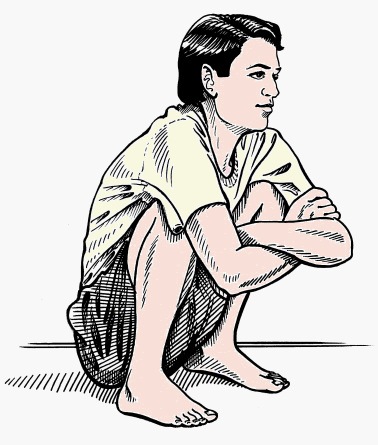
The Basis for a Healthier Life En español
|

|
Nature's PlatformTM
The Basis for a Healthier Life En español
|
|
 GEMS FROM DOWN UNDER 
Australian Perspectives on Squatting My Child, My Teacher The Way to Go - A poem about squatting The In-Lieu Toilet Converter A Bridge Accident in Tasmania Not from the Reader's Digest
My Child, My Teacher
This article is reprinted with the kind permission of the author.
When a child is born, caring parents decide to create a happy, healthy environment for its optimum growth and development. The child expresses its own personality from day one. The need to suckle at the breast is instinctive, as are many growth habits performed before the child begins to learn by example. One habit which has been noted by some parents is that the toddler squats instinctively to use his or her bowels. How easy it is for them to squat down, feet flat on the floor, in absolute comfort! So what happens after that? We teach them to sit on a potty, or worse still, on a toilet with legs dangling. If we are naïve (and I plead guilty to being naïve 30-plus years ago), we expect them to do their duty there and then. After all, isn’t that how everyone goes to the loo, and must not they learn the civilised, acceptable ways of the world? An interesting research paper was published in the journal, Perspectives in Human Biology, late in 1997. The research discusses “squatting facets”, which are well-documented in medical literature. Babies are born with squatting facets on the talus bones of their ankles. In cultures where squatting rather than normal sitting is a way of life, adults retain these facets. But in cultures in which we stand and sit as we grow to adulthood, and rarely squat, squatting facets are no longer evident in adults. It appears to be a case of we lose it if we don’t use it. Of course this research was unrelated to squatting for defaecation, but it could be seen as confirmation that squatting is an appropriate posture for the human body, and somewhere along the way we have become too comfortable in our easy chairs to continue this beneficial habit. Parents who have changed from sitting to squatting for bowel movements have recounted some interesting anecdotes about their children, which suggest that the child’s initial instinct to squat for this daily function should be encouraged. One mother shared the experience of how her toddler squatted for bowel movements in the same general area of their property on each occasion. (They had no close neighbours to offend.) The child was toilet trained and out of nappies at a very early age. A friend, now in her sixties, told how one of her sons suffered from severe constipation in infancy. She solved the problem by giving him a warm bath and then getting him to squat over newspaper in the bathroom. It worked every time! A community nurse described how a 7-year-old girl, who suffered from bowel and bladder incontinence, achieved normal control of both bowel and bladder only three weeks after changing from sitting to squatting as a daily habit. A mother began squatting (because of haemorrhoids and bladder control difficulties) and was copied by her eight-year-old daughter who was fascinated by the new device on the toilet! The mother was thrilled to relate that, as well as her own problems improving significantly, her daughter’s bed-wetting episodes decreased remarkably. On occasions, her daughter would wet the bed twice each night, and three nights consecutively was not unusual. After squatting for bowel movements for two weeks, she wet the bed only once during the following three weeks and has had dry nights ever since. There have been a number of unsolicited comments from mothers who tell of their children being constipated unless they squat for bowel movements. Add to these experiences that of Andrew with Crohn’s Disease [below] and we must surely ask ourselves, what price are we paying for the unnatural Western habit of sitting for defaecation? Andrew (not his real name) was diagnosed with Crohn’s Disease at the tender age of five. As a result of this condition, within a twelve-month period he underwent four separate surgical procedures, with general anesthetic. Neither surgery nor medication helped Andrew, and severe constipation was an ongoing symptom. After his mother read of the benefits of squatting for defaecation, she encouraged Andrew to squat on the toilet seat. She noticed an improvement within two days! Two weeks later the surgeon was astonished at how the inflammation had subsided. Andrew’s mother took the initiative and stopped administering the medication. Within about 12 months, Andrew had lost virtually all symptoms of Crohn’s Disease and the only significant lifestyle change he had made was to squat for bowel movements – which he continues to do. Changes and events in his life which would once have caused a flare-up of symptoms now pass without incident. I am grateful to the mothers who have shared their stories, and especially to the mother of Andrew, who described with anguish how excruciatingly painful the after-effects of surgery had been for her small boy. I have been encouraged to collate the stories and share them with you. It is important that this information is made available to parents who can then choose to make decisions in the best interests of their children. After all, if no one tells us about this private subject, how on earth are we to find out? When we look at nutrition, exercise, education, art, entertainment and all the other things that we consider necessary for the development of our child, remember there is one very simple lifestyle practice – something which a child knows instinctively – which should be encouraged and accepted as normal – the practice of squatting for bowel movements. If we parents are sufficiently open to change, we can be privileged to learn from our children. A beneficial return to squatting for bowel evacuation would set a positive family example. Squatting for defaecation is not something to try only as a last-ditch option for an existing problem. It is an option we can elect to practise to assist with inner cleanliness and to prevent or delay many bowel and bladder problems which are often regarded as age-related. (Perhaps “ignorance-related” because of incorrect information/education would be a more appropriate term.) At some time in the future, the practice of squatting for defaecation must again be recognised as normal. Why not experience the benefits now? It is not something only for the alternate population or for people with problems. When we begin to encourage our children to continue to do what comes naturally, we parents can learn from their example.
NOTES:
The Way to Go by Wal Bowles Not only are we what we eat, We're also what we don't excrete. And if we sit instead of squat, Retaining some of what we've got, This putrefaction will increase, When what we want is fast release Of toxic waste from bowel and cell. So, to keep our bodies well, Squatting helps the waste to flow. Squatting is the way to go! A Bridge Accident in Tasmania by Wal Bowles
The Tasman Bridge crosses the Derwent River in Hobart, Australia, on the island of Tasmania. In 1975 a pylon of the bridge was struck by a freighter, causing one of the spans to collapse. It was drizzling and after dark, so visibility was poor. Bridge traffic kept coming over the rise in the bridge and hurtling 110 feet into the river below. I don't think the final death toll was ever known. But apparently one driver became aware of the collapsed span. He stopped his car and tried to warn others, but most of them took no notice and kept going to their deaths. When I talk to people about squatting, I often feel like that guy. I feel the frustration he must have felt. The response of most people is that they don't want to know about it, many seem to think they are being had by some practical joker, others that it's a sales gimic, others that the only appropriate opening for anyone stupid enough to promote such an idea is the door into a lunatic asylum. It's only when people see that their lifespan is shortening before their eyes that they become open to the idea and, if it's not too late, it usually works positively for them. by Wal Bowles My good friend, Bill Withers, has rubbed shoulders with people from all walks of life. A couple of years ago, he was attending an upmarket evening meal with many high society people present. Sitting at Bill’s table were a couple of young, attractive females. After the meal, when people were drinking coffee or whatever, a matronly lady approached Bill’s table and asked if they minded if she sat with them. She explained that the conversation at all the other tables seemed very reserved and Bill’s was the only table where everyone – from the almost non-stop laughter – seemed to be enjoying themselves. One of the young, attractive females responded to the request by saying words to the effect, “Most certainly, come and sit with us. This bloke is teaching us how to crap correctly!” 
Learn How Squatting Can Help Prevent Constipation, Hemorrhoids, Appendicitis, Colitis, Diverticulosis, Hernias, Heart Attacks, Prostate Disorders and Colon Cancer Nature's Platform - Pictures and Ordering Information 
Jasmine Margaret and Wal's beloved pooch |
|
Do-It-Yourself Earthing Device |
|
Nature's Platform 186 Westside Drive Boone, NC 28607, USA 828-263-6884 Email address: NaturesPlatform [AT] hotmail.com |
|
Guarantee . Privacy . Help . About Us . Home . Place an Order . Endorsements . Health Benefits . F.A.Q. Copyright ©2001, Nature's Platform. All rights reserved. Web Site Produced by Magnadev, Inc. |